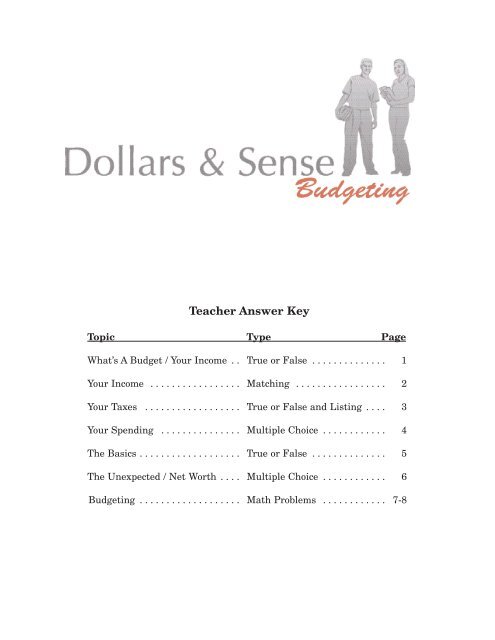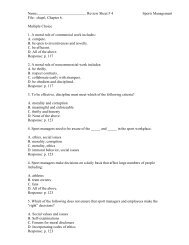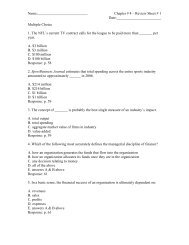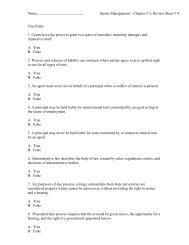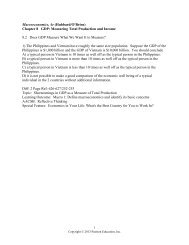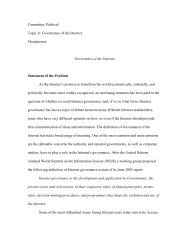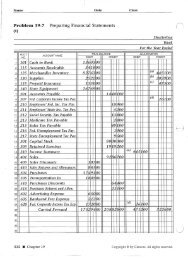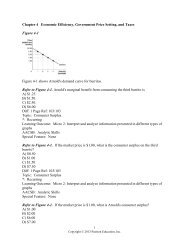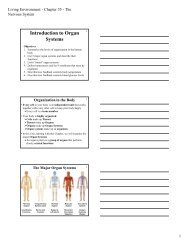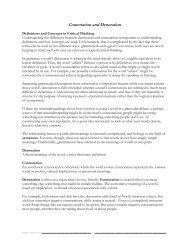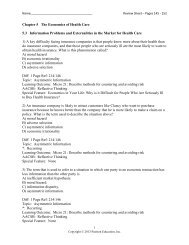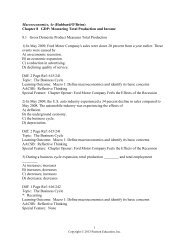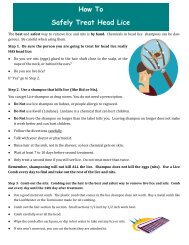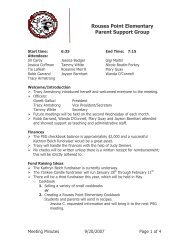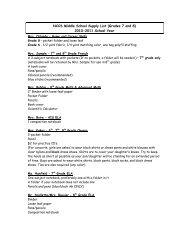Teacher Answer Key - Home Page of the Cougars!
Teacher Answer Key - Home Page of the Cougars!
Teacher Answer Key - Home Page of the Cougars!
You also want an ePaper? Increase the reach of your titles
YUMPU automatically turns print PDFs into web optimized ePapers that Google loves.
<strong>Teacher</strong> <strong>Answer</strong> <strong>Key</strong><br />
Topic Type <strong>Page</strong><br />
What’s A Budget / Your Income . . True or False . . . . . . . . . . . . . . 1<br />
Your Income . . . . . . . . . . . . . . . . . Matching . . . . . . . . . . . . . . . . . 2<br />
Your Taxes . . . . . . . . . . . . . . . . . . True or False and Listing . . . . 3<br />
Your Spending . . . . . . . . . . . . . . . Multiple Choice . . . . . . . . . . . . 4<br />
The Basics . . . . . . . . . . . . . . . . . . . True or False . . . . . . . . . . . . . . 5<br />
The Unexpected / Net Worth . . . . Multiple Choice . . . . . . . . . . . . 6<br />
Budgeting . . . . . . . . . . . . . . . . . . . Math Problems . . . . . . . . . . . . 7-8
Budgeting What’s A Budget? / Your Income 1<br />
1) Circle True or False after each statement.<br />
1.<br />
A budget will help you learn to live on your income . . . . . . . . . . . . . . . . . . .<br />
True<br />
False<br />
2.<br />
3<br />
A budget will guarantee that you always have enough income to live on . .<br />
A variable source <strong>of</strong> income is easier to budget than a fixed source . . . . . . .<br />
True False<br />
True False<br />
4.<br />
A budget will help you be independent . . . . . . . . . . . . . . . . . . . . . . . . . . . . . .<br />
True<br />
False<br />
5.<br />
A salary, commisions and gifts are all fixed sources <strong>of</strong> income . . . . . . . . . . .<br />
True False<br />
6.<br />
One goal <strong>of</strong> budgeting is to smooth out <strong>the</strong> bumps in your income . . . . . . .<br />
True<br />
False<br />
7.<br />
8.<br />
You can not control when your bills are due . . . . . . . . . . . . . . . . . . . . . . . . . .<br />
Royalties and pr<strong>of</strong>its are both fixed sources <strong>of</strong> income . . . . . . . . . . . . . . . . .<br />
True False<br />
True False<br />
9.<br />
A biweekly paycheck comes every two weeks . . . . . . . . . . . . . . . . . . . . . . . . .<br />
True<br />
False<br />
10.<br />
It is important not only to know how much you’re paid, but when you’re<br />
paid . . . . . . . . . . . . . . . . . . . . . . . . . . . . . . . . . . . . . . . . . . . . . . . . . . . . . . . . . .<br />
True<br />
False<br />
11.<br />
Captial gains and bonuses are variable sources <strong>of</strong> income . . . . . . . . . . . . . .<br />
True<br />
False<br />
12.<br />
The three most common pay periods are bimonthly, monthly and biweekly<br />
True False<br />
13.<br />
Your budget needs to match your spending to when you receive your income<br />
True<br />
False<br />
14.<br />
Tips, interest and dividends are all fixed sources <strong>of</strong> income . . . . . . . . . . . . .<br />
True False<br />
15.<br />
It would not be uncommon for a high school student to receive wages, gifts<br />
and interest as income . . . . . . . . . . . . . . . . . . . . . . . . . . . . . . . . . . . . . . . . . . .<br />
True<br />
False<br />
16.<br />
Most workers’ income includes ei<strong>the</strong>r wages or a salary . . . . . . . . . . . . . . . .<br />
True<br />
False<br />
17.<br />
18.<br />
It would not be uncommon for a high school student to receive a salary,<br />
pr<strong>of</strong>its and dividends as income . . . . . . . . . . . . . . . . . . . . . . . . . . . . . . . . . . .<br />
In general, all income can be defined as payment for work . . . . . . . . . . . . .<br />
True False<br />
True False<br />
19.<br />
A budget is a spending plan to control <strong>the</strong> flow <strong>of</strong> your money . . . . . . . . . . .<br />
True<br />
False<br />
20.<br />
A budget will help you reach your financial goals . . . . . . . . . . . . . . . . . . . . .<br />
True<br />
False<br />
Name: ____________________________________<br />
Class: _______________________ Period: ____
Budgeting Your Income 2<br />
1) Listed below are 21 types <strong>of</strong> income. Match each type <strong>of</strong> income with <strong>the</strong> proper definition.<br />
1. Alimony<br />
2. Allowance<br />
3. Annuity<br />
4. Bonus<br />
5. Capital Gain<br />
6. Child Support<br />
7. Commission<br />
8. Disability Income<br />
9. Dividend<br />
10. Gift<br />
11. Hourly Wage<br />
12. Interest<br />
13. Pension<br />
14. Pr<strong>of</strong>it<br />
15. Rent<br />
16. Royalties<br />
17. Salary<br />
18. Social Security<br />
19. Tip<br />
20. Trust Fund<br />
21. Unemployment Benefits<br />
11<br />
9<br />
16<br />
2<br />
18<br />
17<br />
21<br />
19<br />
6<br />
7<br />
8<br />
10<br />
1<br />
5<br />
13<br />
14<br />
4<br />
3<br />
20<br />
15<br />
12<br />
A pay scale defined as a specific amount per time period worked.<br />
A portion <strong>of</strong> a corporation's distributed pr<strong>of</strong>its normally measured as an amount per share.<br />
A payment for rights to property based on a percentage <strong>of</strong> <strong>the</strong> revenue generated by it.<br />
An amount <strong>of</strong> money given periodically to an individual for performing little or no work.<br />
Government payments to elderly, unemployed and disabled persons financed by contributions from<br />
employees and employers.<br />
A fixed, yearly compensation paid to a person for regular work or services.<br />
Regular payments from state funds <strong>of</strong> a certain amount <strong>of</strong> money to qualified workers without jobs.<br />
A gratuity received for service.<br />
Payments made by one party for care and upbringing <strong>of</strong> a child after divorce.<br />
A sum <strong>of</strong> money paid to an agent or salesperson.<br />
Transfer payments made to individuals who are seriously or permanently disabled.<br />
Money or property given freely to ano<strong>the</strong>r.<br />
A legally required allowance for maintenance paid by one spouse to ano<strong>the</strong>r upon separation or divorce.<br />
An increase in <strong>the</strong> value <strong>of</strong> an asset.<br />
Regular income payments made to an employee after <strong>the</strong>y retire.<br />
The net amount earned after deducting <strong>the</strong> costs <strong>of</strong> doing business.<br />
A payment in addition to <strong>the</strong> normal wage or salary as a reward for work well done.<br />
An investment plan providing guaranteed retirement income.<br />
An amount <strong>of</strong> money or property administered by an individual or organization for <strong>the</strong> benefit <strong>of</strong> ano<strong>the</strong>r<br />
individual or organization.<br />
Payment for <strong>the</strong> use <strong>of</strong> real property.<br />
The price paid for <strong>the</strong> use <strong>of</strong> money over time.<br />
Name: ____________________________________<br />
Class: _______________________ Period: ____
Budgeting Your Taxes 3<br />
1) Circle True or False after each statement.<br />
1.<br />
What you make is not what you get to keep . . . . . . . . . . . . . . . . . . . . . . . . . .<br />
True<br />
False<br />
2.<br />
Gross pay minus deductions equals take home pay . . . . . . . . . . . . . . . . . . . .<br />
True<br />
False<br />
3<br />
4.<br />
5.<br />
6.<br />
Everyone has four tax deductions including federal, state and local income<br />
tax . . . . . . . . . . . . . . . . . . . . . . . . . . . . . . . . . . . . . . . . . . . . . . . . . . . . . . . . . . .<br />
Net pay minus deductions equals take home pay . . . . . . . . . . . . . . . . . . . . .<br />
Most people’s tax deductions include federal income tax, social security tax<br />
and medicare tax . . . . . . . . . . . . . . . . . . . . . . . . . . . . . . . . . . . . . . . . . . . . . . .<br />
Withholding is <strong>the</strong> sum <strong>of</strong> <strong>the</strong> taxes deducted from your paycheck . . . . . . .<br />
True False<br />
True False<br />
True False<br />
True False<br />
7.<br />
Gross pay minus deductions equals net pay . . . . . . . . . . . . . . . . . . . . . . . . . .<br />
True<br />
False<br />
8.<br />
Tax Freedom Day changes over <strong>the</strong> years . . . . . . . . . . . . . . . . . . . . . . . . . . .<br />
True<br />
False<br />
9.<br />
Most <strong>of</strong> your take home pay will be used to pay bills . . . . . . . . . . . . . . . . . .<br />
True<br />
False<br />
10.<br />
Tax Freedom day is typically in February . . . . . . . . . . . . . . . . . . . . . . . . . . .<br />
True False<br />
2) Make a list <strong>of</strong> all <strong>the</strong> taxes you and your family pay each year.<br />
1. _____________________________________________________________________________________<br />
2. _____________________________________________________________________________________<br />
3. _____________________________________________________________________________________<br />
4. _____________________________________________________________________________________<br />
5. _____________________________________________________________________________________<br />
6. _____________________________________________________________________________________<br />
7. _____________________________________________________________________________________<br />
8. _____________________________________________________________________________________<br />
9. _____________________________________________________________________________________<br />
10. _____________________________________________________________________________________<br />
11. _____________________________________________________________________________________<br />
12. _____________________________________________________________________________________<br />
13. _____________________________________________________________________________________<br />
Name: ____________________________________<br />
Class: _______________________ Period: ____
Budgeting Your Spending 4<br />
1) Read each <strong>of</strong> <strong>the</strong> following statements and place a check<br />
mark below <strong>the</strong> type <strong>of</strong> expense or spending it represents.<br />
1) Rent . . . . . . . . . . . . . . . . . . . . . . . . . . . . . . . ̌<br />
2) Car Repair . . . . . . . . . . . . . . . . . . . . . . . . . . ̌<br />
3) Groceries . . . . . . . . . . . . . . . . . . . . . . . . . . . ̌<br />
4) Car Payment . . . . . . . . . . . . . . . . . . . . . . . . ̌<br />
5) Hospital Bill . . . . . . . . . . . . . . . . . . . . . . . . . ̌<br />
6) Concert Tickets . . . . . . . . . . . . . . . . . . . . . . ̌<br />
7) Clothing . . . . . . . . . . . . . . . . . . . . . . . . . . . . ̌ ̌<br />
8) Car Maintenance . . . . . . . . . . . . . . . . . . . . . ̌<br />
9) Gifts . . . . . . . . . . . . . . . . . . . . . . . . . . . . . . . ̌ ̌<br />
10) Utility Bills . . . . . . . . . . . . . . . . . . . . . . . . . ̌<br />
11) Mortgage . . . . . . . . . . . . . . . . . . . . . . . . . . . . ̌<br />
12) Insurance Premiums . . . . . . . . . . . . . . . . . . ̌ ̌<br />
13) Vacation Travel Expenses . . . . . . . . . . . . . . ̌<br />
14) Gasoline . . . . . . . . . . . . . . . . . . . . . . . . . . . . ̌<br />
15) Savings . . . . . . . . . . . . . . . . . . . . . . . . . . . . . ̌<br />
16) Credit Card Payments . . . . . . . . . . . . . . . . . ̌<br />
17) <strong>Home</strong> Furnishings . . . . . . . . . . . . . . . . . . . . ̌ ̌<br />
18) Child Care Expenses . . . . . . . . . . . . . . . . . . ̌<br />
19) Books, CDs and DVDs . . . . . . . . . . . . . . . . . ̌<br />
20) Eating Out . . . . . . . . . . . . . . . . . . . . . . . . . . ̌ ̌<br />
Discretionary Spending<br />
Unexpected Expense<br />
Periodic Expense<br />
Variable Expense<br />
Fixed Expense<br />
Name: ____________________________________<br />
Class: _______________________ Period: ____
Budgeting The Basics 5<br />
1) Circle True or False after each statement.<br />
1.<br />
Avoid impulse buying. Decide if you really want it or need it . . . . . . . . . . . .<br />
True<br />
False<br />
2.<br />
Convenience stores are inexpensive places to buy food . . . . . . . . . . . . . . . . .<br />
True False<br />
3<br />
When buying clothing, quality is worth <strong>the</strong> extra money . . . . . . . . . . . . . . .<br />
True<br />
False<br />
4.<br />
Cooking is always cheaper than buying prepared foods . . . . . . . . . . . . . . . .<br />
True False<br />
5.<br />
Most <strong>of</strong> your disposable income will be spent buying <strong>the</strong> basics . . . . . . . . . .<br />
True<br />
False<br />
6.<br />
End <strong>of</strong> season sales is a great way to save money buying clothing . . . . . . .<br />
True<br />
False<br />
7.<br />
Buying <strong>the</strong> basics refers to discretionary spending . . . . . . . . . . . . . . . . . . . .<br />
True False<br />
8.<br />
Make a list before you go grocery shopping and stick to it . . . . . . . . . . . . . .<br />
True<br />
False<br />
9.<br />
When buying clo<strong>the</strong>s, try <strong>the</strong>m on. Reading <strong>the</strong> size is not enough . . . . . . .<br />
True<br />
False<br />
10.<br />
Two benefits <strong>of</strong> renting are mobility and cost . . . . . . . . . . . . . . . . . . . . . . . . .<br />
True<br />
False<br />
11.<br />
Car insurance is normally a small expense for young drivers . . . . . . . . . . .<br />
True False<br />
12.<br />
Your utility bills can include electricity, cable TV and cell phone . . . . . . . . .<br />
True<br />
False<br />
13.<br />
Learn to read food labels so you know what you are buying . . . . . . . . . . . . .<br />
True<br />
False<br />
14.<br />
Inspect a used car carefully before you buy . . . . . . . . . . . . . . . . . . . . . . . . . .<br />
True<br />
False<br />
15.<br />
16.<br />
Two expenses <strong>of</strong> renting would be insurance and real estate taxes . . . . . . .<br />
Always buy national food brands ra<strong>the</strong>r than lower grades . . . . . . . . . . . . .<br />
True False<br />
True False<br />
17.<br />
Eating out and bringing in saves time, but is expensive . . . . . . . . . . . . . . . .<br />
True<br />
False<br />
18.<br />
When shopping for clo<strong>the</strong>s, be sure to buy <strong>the</strong> latest fads to be in style . . .<br />
True False<br />
19.<br />
Three benefits <strong>of</strong> buying a home are equity, appreciation and tax savings .<br />
True<br />
False<br />
20.<br />
Car expenses can include payments, insurance, gas and maintenance . . . .<br />
True<br />
False<br />
Name: ____________________________________<br />
Class: _______________________ Period: ____
Budgeting The Unexpected / Net Worth 6<br />
1) Read each statement and circle A, B or C based on whe<strong>the</strong>r your first line <strong>of</strong> defense against<br />
<strong>the</strong> unexpected expense would be (A) savings, (B) insurance or (C) credit. You may decide <strong>the</strong>re<br />
is more than one answer.<br />
1.<br />
2.<br />
3.<br />
4.<br />
5.<br />
6.<br />
7.<br />
8.<br />
9.<br />
10.<br />
Your car just died and you need to buy a new one . . . . . . . . . . . . . . . . . . . .<br />
Your refrigerator needs repaired . . . . . . . . . . . . . . . . . . . . . . . . . . . . . . . . . .<br />
You have a serious illness and need to have surgery . . . . . . . . . . . . . . . . . .<br />
You had a car wreck and you were at fault . . . . . . . . . . . . . . . . . . . . . . . . . .<br />
Your TV quit working and you need to buy a new one . . . . . . . . . . . . . . . . .<br />
Your home burned down . . . . . . . . . . . . . . . . . . . . . . . . . . . . . . . . . . . . . . . . .<br />
You have been laid <strong>of</strong>f for two months and are looking for a new job . . . . .<br />
Your apartment was robbed . . . . . . . . . . . . . . . . . . . . . . . . . . . . . . . . . . . . . .<br />
The transmission in your old car went out . . . . . . . . . . . . . . . . . . . . . . . . . .<br />
There has been a death in your family and you have to fly home . . . . . . . .<br />
A B C<br />
A B C<br />
A B C<br />
A B C<br />
A B C<br />
A B C<br />
A B C<br />
A B C<br />
A B C<br />
A B C<br />
2) After each item, circle whe<strong>the</strong>r it is an asset or a liability.<br />
1.<br />
2.<br />
Your checking account . . . . . . . . . . . . . . . . . . . . . . . . . . . . . . . . . . . . . .<br />
Your car loan . . . . . . . . . . . . . . . . . . . . . . . . . . . . . . . . . . . . . . . . . . . . . .<br />
Asset Liability<br />
Asset Liability<br />
3.<br />
A savings bond . . . . . . . . . . . . . . . . . . . . . . . . . . . . . . . . . . . . . . . . . . . .<br />
Asset<br />
Liability<br />
4.<br />
Your income from work . . . . . . . . . . . . . . . . . . . . . . . . . . . . . . . . . . . . . .<br />
Asset<br />
Liability<br />
5.<br />
Taxes you owe . . . . . . . . . . . . . . . . . . . . . . . . . . . . . . . . . . . . . . . . . . . . .<br />
Asset Liability<br />
6.<br />
The equity in your home . . . . . . . . . . . . . . . . . . . . . . . . . . . . . . . . . . . .<br />
Asset<br />
Liability<br />
7.<br />
Life insurance cash value . . . . . . . . . . . . . . . . . . . . . . . . . . . . . . . . . . . .<br />
Asset<br />
Liability<br />
8.<br />
9.<br />
Your credit card balance . . . . . . . . . . . . . . . . . . . . . . . . . . . . . . . . . . . . .<br />
Your outstanding bills . . . . . . . . . . . . . . . . . . . . . . . . . . . . . . . . . . . . . . .<br />
Asset Liability<br />
Asset Liability<br />
10.<br />
Stocks and mutual funds you own . . . . . . . . . . . . . . . . . . . . . . . . . . . . .<br />
Asset<br />
Liability<br />
Name: ____________________________________<br />
Class: _______________________ Period: ____
Budgeting Math Problems 7<br />
Solve each <strong>of</strong> <strong>the</strong> following problems.<br />
1.<br />
Marilyn's biweekly gross pay is $1,200. Her deductions include 9.4% for<br />
federal income tax, 6.2% for social security, 1.45% for medicare, and 3.5% for<br />
state income tax. She has to pay her rent which is $550. How much will she<br />
have left for o<strong>the</strong>r expenses?<br />
$1,200 x .094 = $112.80<br />
$1,200 x .062 = $74.40<br />
$1,200 x .0145 = $17.40<br />
$1,200 x .035 = $42.00<br />
$112.80 + $74.40 + $17.40 + $42.00 = $246.60<br />
$1,200 - $246.60 - $550 = $403.40<br />
$ 403.40<br />
2.<br />
The Smith's current net worth is $324,476. Their assets have increased by<br />
$11,346 and $9,786 over <strong>the</strong> last two years and <strong>the</strong>ir liabilities have increased<br />
by $6,432 and $4,823. What was <strong>the</strong>ir net worth two years ago?<br />
$11,346 + $9,786 = $21,132<br />
$6,432 + $4,823 = $11,255<br />
$21,132 - $11,255 = $9,877<br />
$324,476 - $9,877 = $314,599<br />
$ 314,599<br />
3.<br />
During <strong>the</strong> year, Ray paid <strong>the</strong> following electric bills: $82.74, $80.22, $73.18,<br />
$71.82, $69.80, $121.96, $138.58, $105.85, $124.33, $72.67, $74.80, $80.75.<br />
How many times greater than <strong>the</strong> smallest bill was <strong>the</strong> largest bill?<br />
$138.58 / $69.80 = 1.985 = 1.99<br />
1.99<br />
4.<br />
For her cable TV service, Rita has chosen expanded cable (channels 3-54) at<br />
$24.05 plus two movie channels at $14.00 each. What is her monthly cost per<br />
channel?<br />
$ 0.96<br />
$24.05 + $28.00 = $52.05<br />
$52.05 / 54 = $ .96<br />
Name: ____________________________________<br />
Class: _______________________ Period: ____
Budgeting Math Problems 8<br />
Solve each <strong>of</strong> <strong>the</strong> following problems.<br />
5.<br />
The Bradshaws estimated that <strong>the</strong>y spent $2,965 last year on food for <strong>the</strong>ir<br />
family <strong>of</strong> five. If $1,114 was spent on food away from home, what percentage<br />
<strong>of</strong> <strong>the</strong>ir food budget was spent on food at home?<br />
$2,965 - $1,114 = $1,851<br />
$1,851 / 2,965 = .624 = 62.4%<br />
62.4 %<br />
6.<br />
Russ has $120 deducted from each <strong>of</strong> his 26 paychecks and deposited in his<br />
401(k) retirement plan. If <strong>the</strong> company matches 50% <strong>of</strong> his deposits, how<br />
much will have been deposited in a year?<br />
$120 x 26 = $3,120<br />
$3,120 x 1.5 = $4,680<br />
$ 4,680.00<br />
7.<br />
In adding up <strong>the</strong>ir total liabilities, <strong>the</strong> Swansons found <strong>the</strong>y owed an average<br />
<strong>of</strong> $2,855 on two different credit cards. One credit card had a balance <strong>of</strong><br />
$3,142. What was <strong>the</strong> balance on <strong>the</strong> o<strong>the</strong>r card?<br />
$3,142 + x = $2,855 (2)<br />
$3,142 + x = $5,710<br />
x = $2,568<br />
$ 2,568.00<br />
8.<br />
One family spent 6.5% <strong>of</strong> <strong>the</strong>ir $55,250 yearly income on clothing. Ano<strong>the</strong>r<br />
family spent 7.3% <strong>of</strong> <strong>the</strong>ir $42,500 income. What was <strong>the</strong> average amount <strong>the</strong><br />
two families spent on clothing?<br />
$55,250 x .065 = $3,591.25<br />
$42,500 x .073 = $3,102.50<br />
$3,591.25 + $3,102.50 = $6,693.75<br />
$6,693.75 / 2 = $3,346.88<br />
$ 3,346.88<br />
Name: ____________________________________<br />
Class: _______________________ Period: ____


